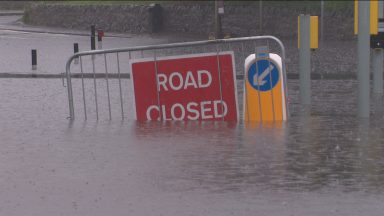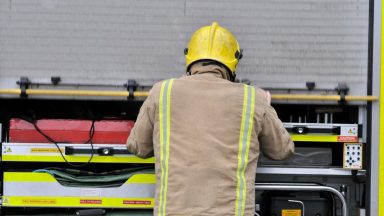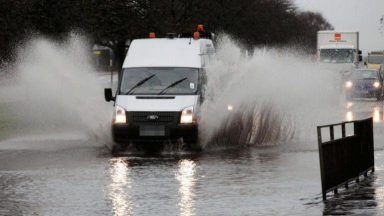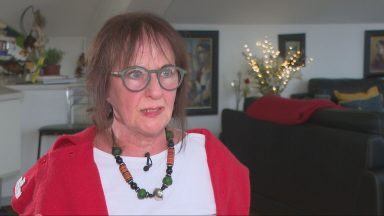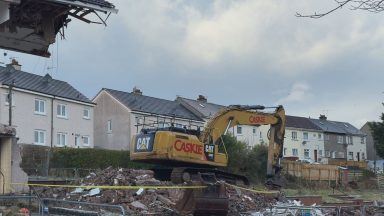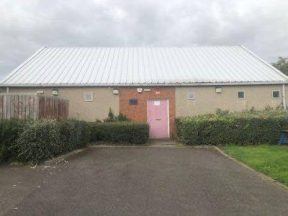Glasgow taxi and private hire drivers say there are already enough cabs operating in the city — and lifting a cap could risk public safety.
Unite the union and the Scottish Private Hire Association (SPHA) led a rally outside Glasgow city chambers, which called for over-provision policies, limiting the number of vehicles, to be kept in place.
The council recently held a consultation on the cap after concerns were raised about the availability of cabs, particularly late at night. Ride-hailing app Uber and business leaders in the city are in favour of its removal.
But drivers at the rally believe changes to the cap could “flood the market”, hitting their earnings and forcing them to work “more and more” hours, causing safety risks.
Academic research previously highlighted anxieties over securing a ride home can put people off visiting the city centre in the evening.
The over-provision policies were last reviewed in 2023, when Glasgow’s licensing committee agreed to make 255 more private hire car licences available to address demand at busy times.
Neil Scoffield, a private hire driver, said: “My worry is that again, just to try and keep everyone happy, they are going to up the number. It is hard already out here, it’s not busy. The city centre is on its knees.
“You go through the city, there are cars parked up everywhere. If you increase the number, you are going to cause damage to the trade that is irreversible.”
Ahead of the rally, Unite had prepared a petition, signed by almost 550 people, which called for the cap to remain while the SPHA put together a membership ballot report, where 83% of members, on a 79% turnout, supported keeping it.
Gary Watson, from Unite, said: “There are enough taxis out there, whether it is hackney or private hire, we have a combination here from both trades and we are suffering out there.
“There’s high costs on insurance, there’s high parts… it’s a tight ship. We don’t want any more plates to be issued.
“It is busy, maybe between midnight and 1.30am on a Saturday night, but that is only a short spell. Any city in Britain would be the same.
“If you or I were out, we’d be only too willing to wait 15 or 20 minutes for a cab, so we are saying that’s the busy time, but when it comes to the Monday, Tuesday, Wednesday, day shift or nightshift, that’s a different story.”
Currently, the number of taxis is allowed to reach 1,420 and private hire cars can get to 3,450. Private hires are at the limit, with hundreds of bids for new licences rejected over the past year. The number of taxis has been below the cap.
One driver at the rally, Alfie Wellcoat, said: “The likes of Uber or any other company could just buy up as many cars as they want and then flood the market, then it would just be an over saturation like it is in London and many other cities around the world.
“You’ll get an Uber in one minute but it’ll just mean we’re all chasing the work because there’s not enough work. Right now it’s probably a good level, I know at night time there might not be enough cars out but there’s enough drivers and enough cars in the mix, there’s just not enough guys going out and working at night time.”
He said drivers can be put off from working late due to roadworks as well as customers being “a little bit more lively”. “In the evenings, you get more problems,” he added.
A report on the findings from the consultation on the over-provision policies will be presented to the licensing committee in the coming months, before any decision is made.
Reports by market research agency Progressive Partnership and Glasgow Caledonian University Moffat Centre, commissioned by the council, indicated “the late night city centre economy continues to face a number of post-covid challenges”.
They highlighted issues “relating to a lack of late-night transport options including the availability of taxi and private hire cars acting as a deterrent to people coming in the city centre area later in the evening”.
Eddie Grice, the Glasgow branch convenor of the SPHA, said the reports had found a shortage of taxis was “just one possible option” for problems with nightlife.
“If you look across the UK, every city suffers with a nightlife problem and Glasgow is the only city with a cap,” he added. “I think there are enough drivers out. We are talking about peak time demand, that is always going to be a bit of a sticking point. For the rest of the week, we are overprovided.”
He added: “You remove the cap, the number of cars will increase, the amount of work available for each car is going to dilute.
“The earnings are going to go down, drivers are going to be forced to work more and more hours. It is going to lead to driver fatigue, to not fixing things when they need to be fixed, and to public safety concerns.”
A council spokesman said: “Taxi and private hire car services have undergone a period of considerable change in recent years.
“Committee members therefore wished to reflect on whether the policies that regulate these services remain proportionate and necessary.
“The recent consultation on the number of taxi and private hire cars eligible to operate in Glasgow was open to all and has drawn in a wide range of opinion on this matter.
“A report on the findings of the consultation will be brought forward in the near future. Committee members will determine the approach to be taken following consideration of this report.”
Follow STV News on WhatsApp
Scan the QR code on your mobile device for all the latest news from around the country


 iStock
iStock

